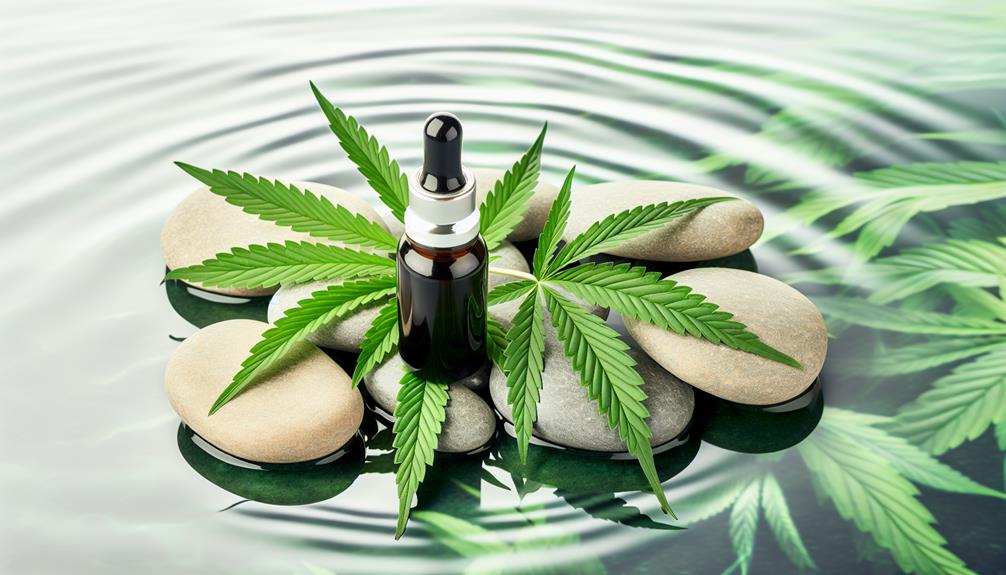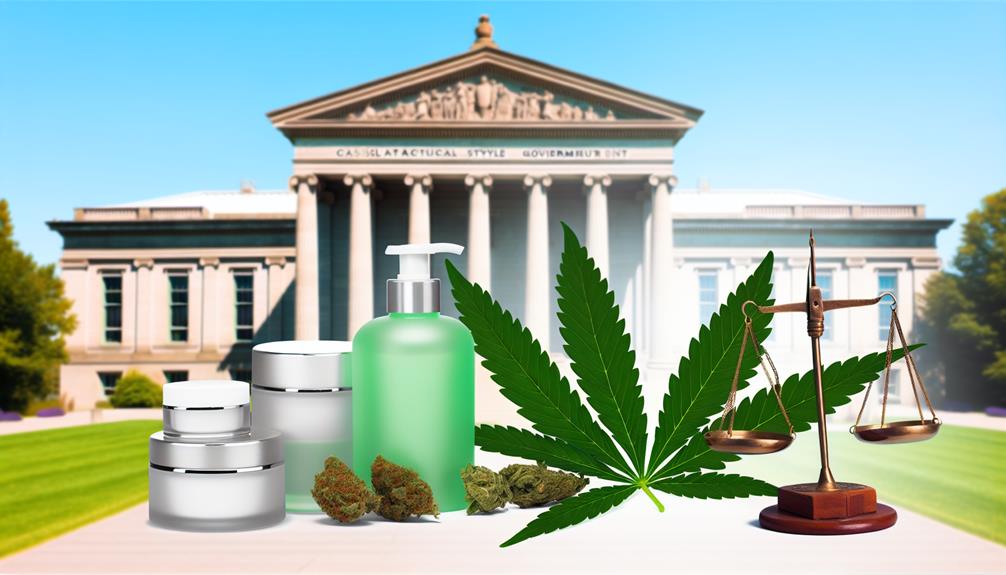Just as Cleopatra might have sworn by her milk and honey baths for timeless beauty, you might find the modern elixir in CBD-infused skincare products. You've probably noticed the surge of these green-labeled jars and bottles on store shelves, touting the benefits of this natural compound. CBD, extracted from the humble hemp plant, has crept into your creams and serums, promising to soothe, rejuvenate, and restore your skin. But with all the buzz, you're left wondering if there's genuine science behind the claims or if it's just another passing trend. As you consider integrating CBD into your skincare routine, you must sift through the layers of anecdotal evidence and explore what research suggests about its real impact on skin health. Let's take a closer look at what's behind the curtain of natural skincare's new favorite ingredient.
Key Takeaways
- CBD interacts with the endocannabinoid system in the skin to maintain balance and health.
- CBD exhibits anti-inflammatory effects that can improve inflammatory skin conditions like acne and psoriasis.
- CBD has soothing properties that can help with skin diseases like eczema and psoriasis and support the skin barrier.
- CBD's antioxidant properties can combat free radicals responsible for skin aging.
Understanding CBD and Skin
As you explore the realm of natural skincare, it's crucial to understand that CBD, or cannabidiol, interacts with the endocannabinoid system in your skin to maintain its balance and health. The ECS, a complex network comprising endocannabinoids, cannabinoid receptors (CB1 and CB2), and associated enzymes, is integral to skin homeostasis. Dysregulation of this system may contribute to skin disorders, bolstering the rationale behind incorporating CBD skincare into your regimen.
CBD's therapeutic potential in the context of skincare stems from its multifaceted properties. It exhibits anti-inflammatory effects that may ameliorate inflammatory skin conditions such as acne and psoriasis. By modulating the activity of CB2 receptors within the skin's ECS, CBD may help reduce inflammation and oxidative stress, which are key contributors to these conditions' pathology.
Moreover, CBD in skincare products has been shown to possess sebostatic properties. This means that it can regulate sebum production, a critical factor in acne development. Excessive sebum, combined with dead skin cells and bacterial growth, leads to acne. By normalizing sebum output, CBD Skin Care options may provide a targeted approach to managing acne-prone skin.
While the potential benefits are promising, challenges persist in ensuring effective transdermal delivery of CBD and determining optimal dosages. Nevertheless, the detailed scientific investigation continues to shed light on how CBD may help in treating various skin conditions, reaffirming its place in the realm of natural skincare solutions.
CBD's Soothing Properties
Building on the understanding of CBD's interaction with the skin's endocannabinoid system, it's notable that its soothing properties offer additional benefits, particularly in reducing inflammation and redness. The application of CBD in skincare, especially within CBD cosmetics, is grounded in its anti-inflammatory and antibacterial activity, which is pivotal for individuals with chronic inflammation or those prone to skin disorders.
In addressing skin diseases such as eczema and psoriasis, CBD's therapeutic potential shines through. This compound not only quells symptomatic discomfort but also supports the integrity of the skin barrier. Its sebostatic effect is crucial in regulating sebum production—a common issue in acne-prone skin. By modulating this process, CBD helps in controlling breakouts and maintaining a balanced, healthy complexion.
When considering CBD's role in natural skincare, the following table delineates its dual action as both therapeutic for skin diseases and beneficial for general skin health:
| Property of CBD | Impact on Skin |
|---|---|
| Anti-inflammatory | Reduces inflammation and redness, beneficial in treating skin disorders |
| Sebostatic | Regulates sebum production, combating acne |
| Antibacterial | Fights against bacterial skin infections, promoting a healthier skin environment |
Employing a scientific lens, it's evident that the detailed mechanisms through which CBD operates underscore its extensive application in both treating specific skin conditions and enhancing overall skin health. Opting for products with tested formulations—such as full-spectrum CBD oil, broad-spectrum CBD oil, or CBD isolate—ensures that you are harnessing the full spectrum of CBD's soothing properties, safeguarding your skin's wellbeing.
CBD for Anti-Aging

Delving into the realm of anti-aging, CBD's antioxidant properties stand out as a formidable adversary against the free radicals responsible for skin aging. Research indicates that CBD oil, replete with these antioxidant and anti-inflammatory qualities, can mitigate the damage inflicted on skin cells by oxidative stress, a principal contributor to the aging process. This damage leads to the breakdown of collagen and elastin, proteins essential for maintaining skin's firmness and elasticity, resulting in the appearance of fine lines and wrinkles.
The benefits of CBD extend beyond its antioxidant capacity. CBD products may also regulate sebum production, which is particularly relevant for those with oily skin, a condition that can exacerbate the aging process. By maintaining a balance in sebum levels, CBD supports a healthier skin environment, thus potentially delaying the onset of age-related changes.
Furthermore, the anti-inflammatory properties of CBD have been shown to assist in the management of dermatological conditions such as eczema and psoriasis. These conditions can cause chronic inflammation, which not only affects skin's appearance but also its ability to function as a barrier. By soothing inflammation, CBD helps to promote a more even skin texture and tone, which is vital for a youthful appearance.
Topical application of CBD in the form of serums and lotions is gaining traction within the anti-aging skincare market. These CBD-infused products harness the compound's therapeutic properties to target the needs of aging human dermal layers. The general safety profile of topical CBD further underscores its appeal as a natural intervention for those seeking to maintain healthy, youthful skin. As you incorporate CBD into your skincare regimen, it's the fusion of these properties that may contribute to a more radiant and age-defiant complexion.
CBD in Acne Management
Harnessing its unique properties, CBD offers potential as a multifaceted agent in the management of acne, influencing sebum production and exhibiting anti-inflammatory effects that could reduce the prevalence and severity of breakouts. Derived from Cannabis sativa, commonly known as hemp, CBD has been spotlighted for its sebostatic action. This means it exerts control over sebaceous glands, which are pivotal in acne vulgaris pathology due to their role in sebum secretion. Excessive sebum can lead to clogged pores and subsequent acne.
Studies indicate that CBD's involvement in skin health extends to its anti-microbial activity. This is particularly relevant since Propionibacterium acnes, the bacteria implicated in acne, thrives in oily environments. By potentially reducing sebum and combatting microbial growth, CBD may serve as an effective agent in treating acne.
The anti-inflammatory properties of CBD are also noteworthy. Inflammation is a hallmark of acne vulgaris, and CBD's capacity to soothe inflamed skin could mitigate the redness and swelling associated with acne lesions. Research underscores the therapeutic promise of CBD in diminishing inflammatory cytokines, thereby interrupting the inflammatory cascade that exacerbates acne.
Moreover, the inclusion of hemp oil in skincare formulations not only delivers CBD but also provides a source of nourishing fatty acids and antioxidants. These constituents further support skin barrier function and offer protective effects against oxidative stress, which is known to aggravate acne and other skin conditions.
Regulatory Landscape for CBD Skincare

The regulatory environment for CBD skincare products is complex and varies significantly across global markets, impacting how companies develop, label, and distribute their offerings. In the United States, the Food and Drug Administration (FDA) recognizes hemp-derived CBD in cosmetics, provided they contain no more than 0.3% THC, as per the 2018 Farm Bill's stipulations. However, the FDA has yet to issue formal regulations for the use of CBD in skincare, leading to a grey area where companies must navigate differing state laws and federal guidelines with caution.
In Canada, the regulatory landscape maintains stringent controls over levels of THC in cosmetic products, including those with hemp extract. Meanwhile, Europe presents a patchwork of regulations, with countries like France allowing cosmetics containing CBD derived from the whole hemp plant, and Sweden requiring products to be free of THC. The European Industrial Hemp Association (EIHA) is advocating for harmonized regulations to facilitate a unified market.
Asia and Australia exhibit further regulatory disparities. For instance, Japan permits the use of CBD in cosmetics, provided there's no detectable THC, aligning with its zero-tolerance stance on cannabis. Conversely, other Asian countries outright ban CBD in skincare. Australia's Therapeutic Goods Administration (TGA) has recently reclassified CBD, enabling low-dose CBD products to be purchased over-the-counter, yet this does not necessarily extend to cosmetics.
With the global CBD skincare market projected to grow exponentially, reaching an estimated $3.4 billion by 2026, the demand for clear, standardized regulations is paramount. Collaboration between Global CBD industry stakeholders and regulatory bodies is crucial for ensuring safety, efficacy, and consumer confidence in broad spectrum hemp skincare products.
Frequently Asked Questions
Do CBD Skincare Products Work?
You're likely wondering if CBD skincare products hold up to the hype. Studies debunk CBD myths, revealing ingredient synergy that may improve skin health. Consumer testimonials often praise their efficacy, but legal status varies, so check your local laws. Ensure product purity; impurities could cause allergic reactions. Topical applications are favored over oral for targeted issues. Price comparisons show a premium for CBD items, influenced by skincare trends. Some even explore DIY recipes for customization.
What Benefits Does CBD Have on the Skin?
Ever wondered how CBD enhances your skin? It's packed with anti-inflammatory properties, crucial for acne reduction and eczema relief. You'll notice improved skin hydration, thanks to its ability to moderate sebum regulation. CBD's antioxidant benefits contribute to UV damage repair and collagen production, fighting off wrinkles. When dealing with psoriasis, its targeted treatment can be a game-changer. So, isn't it time you considered CBD for your skincare routine?
Can Your Body Absorb CBD Through Skin?
Yes, your body can absorb CBD through the skin. Topical bioavailability hinges on skin permeability and the absorption rate, which transdermal technology enhances. Carrier agents facilitate CBD's epidermal penetration to reach dermal layers. Its lipid solubility allows membrane transfer, engaging with underlying cannabinoid receptors. Thus, when applied topically, CBD penetrates the skin, although its efficiency varies based on the product's formulation and concentration.
What Are the Natural Effects of Cbd?
You're seeking relief, balance, and rejuvenation; CBD offers this through its natural effects. It comes packed with antioxidants, combats inflammation, and provides stress relief. You'll experience pain alleviation, hormonal balance, and enhanced skin hydration. CBD's prowess extends to acne reduction, cellular regeneration, and even UV protection by neutralizing free radicals. Each benefit unfolds as CBD interacts with your body's systems, demonstrating a scientific, analytical, and detailed approach to health and well-being.
